Gay Crosse / Gay Crosse and the Good Humor Six
Cleveland, 1930s - 1971

Gay Crosse was a pioneer in Cleveland's R&B and early rock-n-roll musical development. He played sax and sang, leading bands for 20-30 years before passing away relatively young.
Gay moved to Cleveland as a child, having been born in Mobile, Alabama, and by the time he graduated high school, he was leading a band. The band most likely played swing jazz and dance music of the times. The group, Gay Crosse and his Melodians, were featured at social club dance. A 1952 lists the members as Eddie Harris (truimpet), John Whitlow (trumpet), Scotty Ford (sax), Livingston McConnell(sax), Bull Moose Jackson (sax), Fats Austin (bass), and Oliver Hardman (drums).
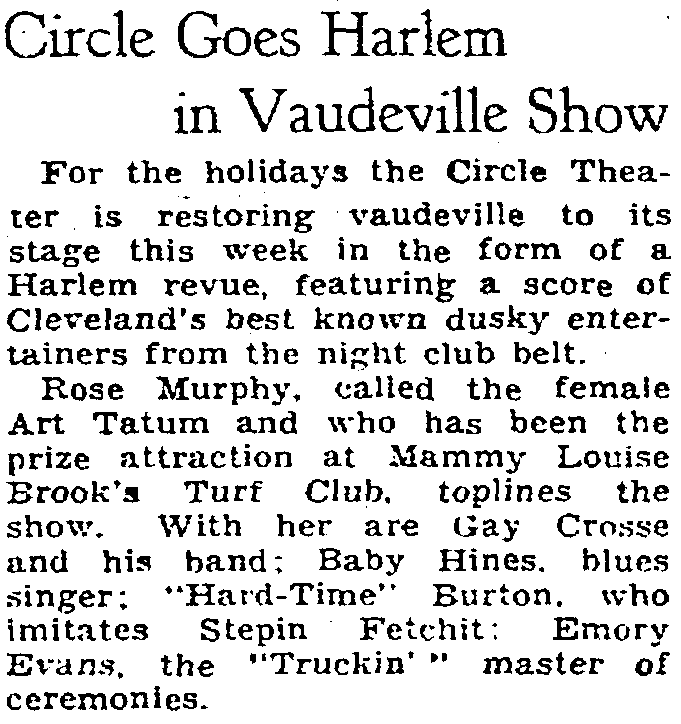
December 1935

October 1936
There isn't much about Gay in the papers from 1938 until 1943. There are a couple references in the papers to him being involved with athletics, possibly boxing and/or bowling. He re-appears on the scene in 1943 as Gay Crosse and the Hellions with a steady gig at the Lucky Room. Gay was primarily a tenor sax player and singer. The typical show for clubs in this era resembled a 'floor show' where there was MCs and a variety of acts, bands, singers, comedians, 'shake dancers' (a form of burlesque) and drag performers (called 'female impersonators'). One of the performers with Gay's band was Stellla "Caledonia" Young who was a well known singer, dancer and R&B group manager throughout the 1950s.
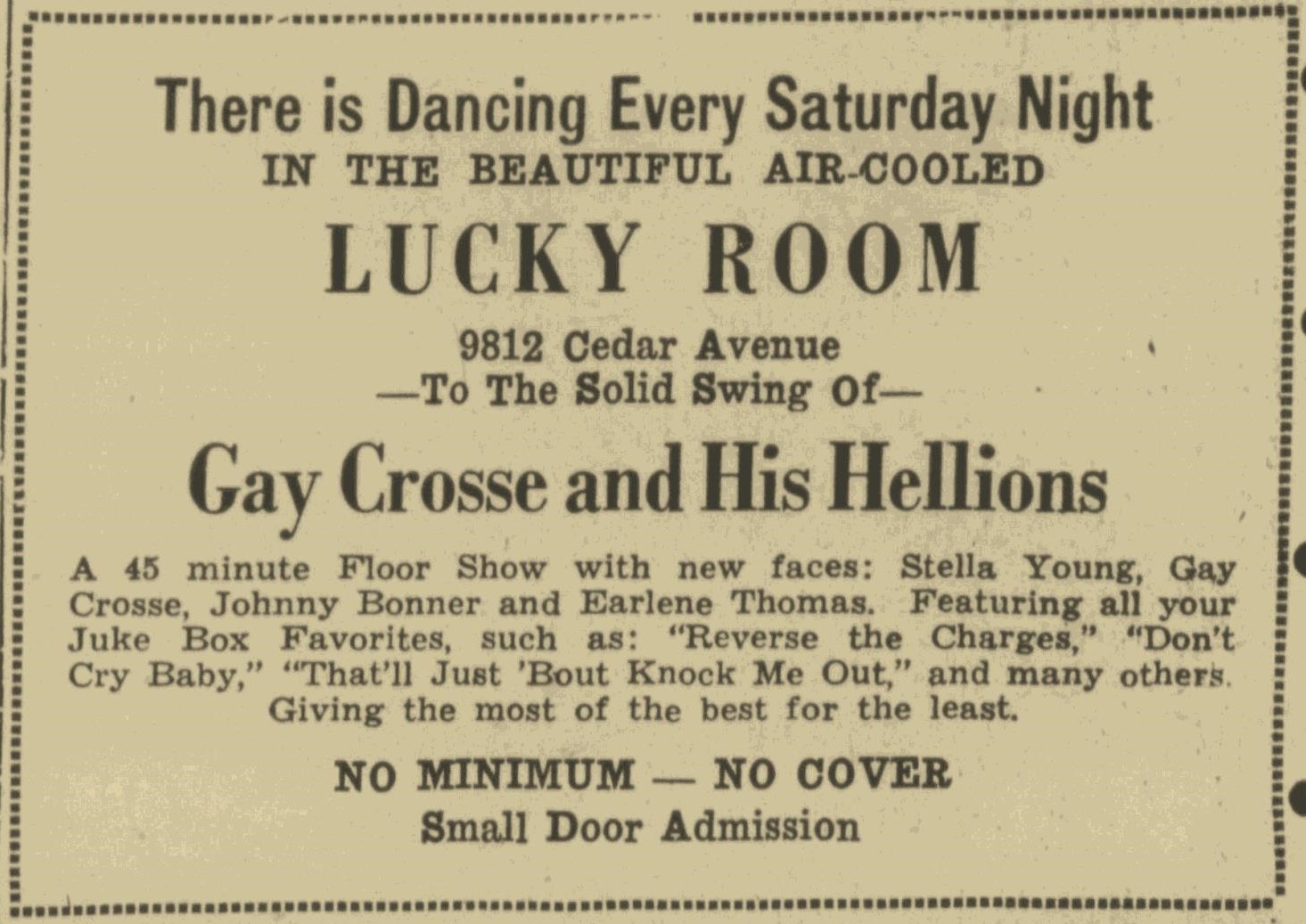
September 1943
As World War II wound down and ended, Cleveland's nightclub scene starrted roaring with postwar optimism and jobs. Crosse and his band were booked at the Blue Grass where they stayed for almost 3 years. During this time the band evolved into a jump/R&B band heavily influenced by Louis Jordan, and adopted the name Gay Crosse and his Good Humor Six. The man himself caught Gay and the band and, according to a story in the Call and Post, was very impressed and offered to sponsor them on a tour to New York City. The band's popularity also landed them a record contract with King records. Thre group made a record (still only 78s) on King's Queen subisidary, it was not a big hit. Gay sings "Gay's Blues" and Walter Carson sings "My Heart", as he seems to have had the better voice for the ballads.

March 1946
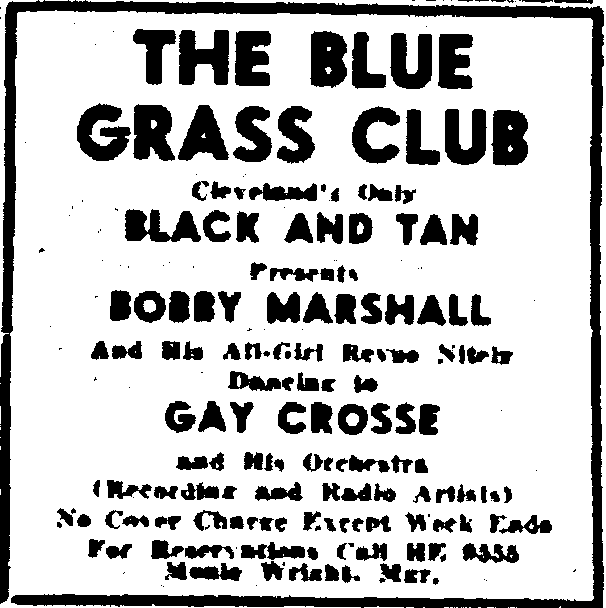
Feb 1947 ad
The group was still at the Blue Grass in 1948 when they made a second record (also only on a 78) for Mercury. The Jordan influence was in clear effect with their cover of "Ain't Nobody Here But Us Chickens". The A side of the release "The Door Is Wide Open" did do some sales as the record was listed in a ad of sellers for a record store in Iowa.
Getting details on these recordings that are nearly 80 years old can be a challenge and there are little details regarding the location and players on the sessions, which get more interesting for Gay's recordings in a few years. The assumption is that the Queen record was recorded in Cincinnati and the Mercury record in Chicago or New York.
A 1947 story about the band in the Call and Post lists the members as Gay on tenor sax and vocals, Baron Lee on alto sax, Eddie Harris on trumpet, Walter Carson on drums, Johnny Latham on bass, and Charlie Ross on keyboards. During 1947, The band had a radio show on WHK, two nights a week, and later a radio show on WJW.

The band left Cleveland for a tour in July 1948, with the players listed above. They returned in early 1949 to play at the Ron-Day-Voo, Gleasons and back to the Blue Grass, before leaving to take a residency in Detroit. They also recorded two more 78s for Capitol records. A March 1949 story lists new members Jimmy Grant on sax and William Cooke on drums.
The groups time in Detroit corresponded with their change to the RCA record label, and gave them the opportunity to be one of the first artists to release a record on RCA's new 45 RPM 7 inch records. The record was released on the orange-red colored vinyl that was listed as cerise by RCA. The band covered "Saturday Night Fish Fry", another Louis Jordan cover than is often considered one of the first rock-n-roll records, especially for a key riff that was later used by Chuck Berry and other Class of '54/'55 rockers.. Eddie Harris left the band in January during the Detroit engagement.
Back home in Cleveland, There are no mentions of Gay in the papers for most of 1950, except for a 'welcome home' show in April. He seems to have spenf most of 1950 on the road, playing Philadephia, Delaware, Rock Island, IL (where his current drummer, Eddie Bourne, was reported as attempting suicide), St. Louis, and Cincinnati. It's possible RCA was pushing him to tour.
Gay returned to Gleason's for a time in the spring/summer of 1951. A September 1951 lists him playing with a 12 piece band, opening for Paul 'Hucklebuck" Wiliiams and Danny Cobb in an event called 'the Calavcade of Stars'. This was a few months before Williams' and Cobb's appearance at the famous Moondog Coronation Ball. He was also playing the Lucky Bar in August of 1951.
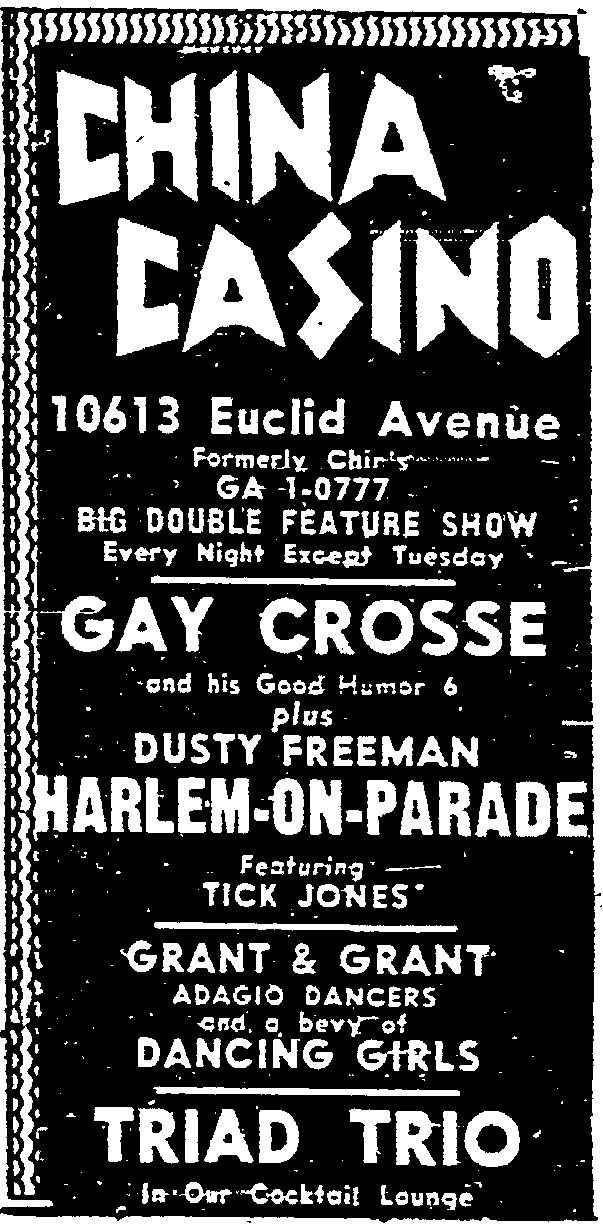
May 1951
Gay returned to the Louis Jordan book in early 1952 with "Fat Sam From Birmingham". Jordan had recorded the song first, but Gay's version was released first and was one of his most successful records. A short time before the recording Gay's band acquired three new members, James Robertson on trumpet, Specs Wright on drums, and John Coltrane on tenor sax. The 'Trane had been playing as a sideman for several years and came from his home in Philadelphia and a gig with Dizzy Gillespie to spend a few months in the band. By May 1952 he had moved on to Earl Bostic's band (with Gene Redd of later King and Redbug records fame), and three years later he became a superstar playing with Miles Davis. A story from April 1952 lists the members as Joe Alexander, Stanley O'Laughlin, James Robertson, Oliver (Junior) Jackson, and John Latham, the last of the 'original' members.

September 1951
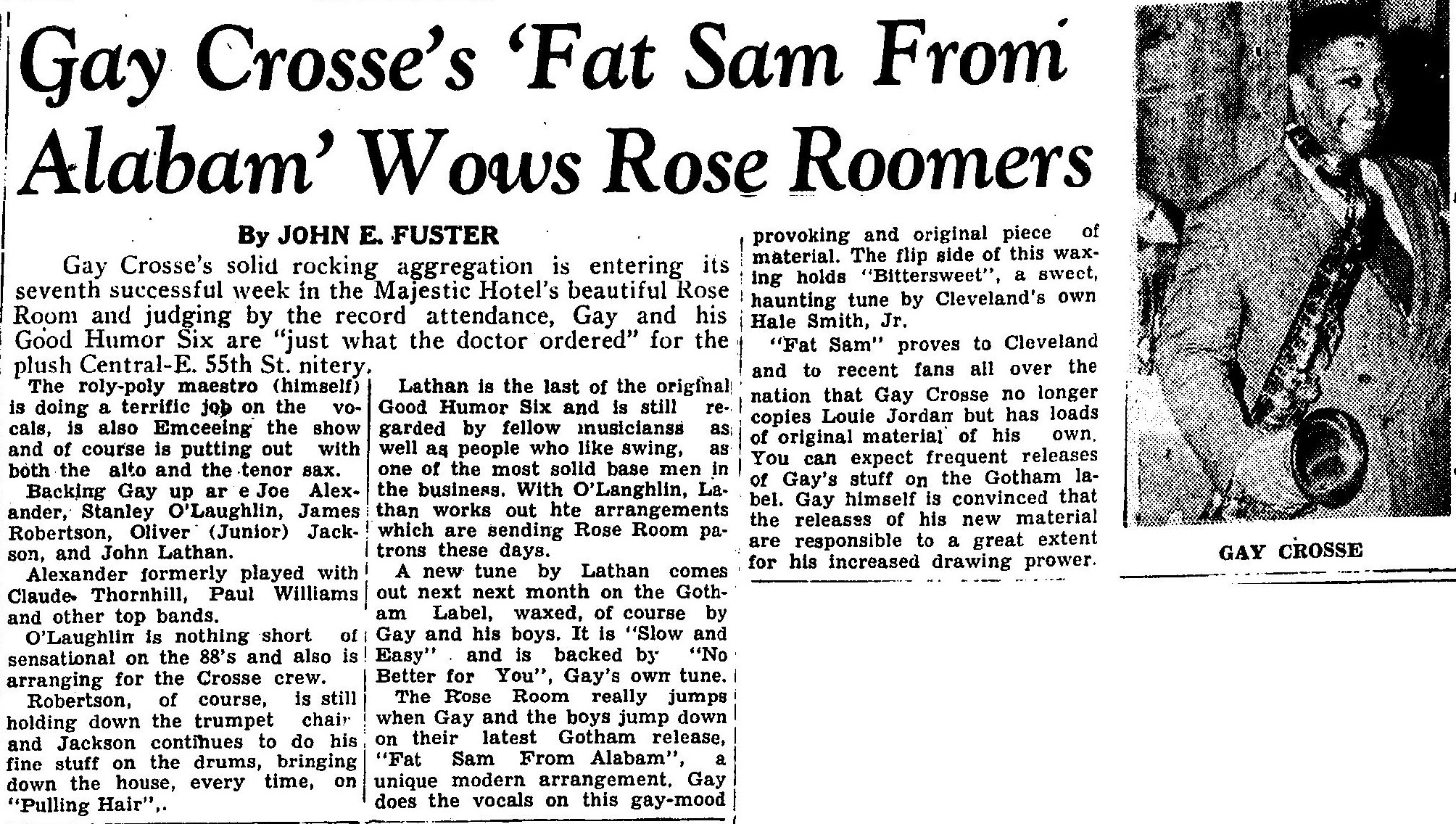
Gay and the band recorded two more 45s in 1952. The records were recorded for the Republic label in Nashville, and were likely recorded when the band played a short run down there. The first 45 was issued in May and would seem to have the players listed in the previous paragraph. During this time they were featured at Cleveland's Rose Room. In December 1952 the band was playing the Ebony Club. The newspaper plug for the gig lists the members as Stanley O'Loughlin on piano, Oliver Jackson on drums, Jimmy Robinson on trumpet, Ali Jackson on bass, Fats Morris on trombone, and according to a newspaper blurb, John Coltrane had rejoined the band. The second 45 from the Nashville session was released in late 1952. According to some online posts, original source unknown, Stanley Turrentine, who gained fame in the late 1960s, was playing on the record, along with Coltrane and Crosse. All three were primarily tenor sax players, which would have been unusual. While Coltrane was mentioned a few times in the Calll and Post (often mispelled as Coletrain or Coltrain) playing with Crosse, there's no mention of Turrentine, although Stanley did play with Cleveland jazz legend Tadd Dameron around the time.

December, 1952, with John "Coletrain"
When the band was recording their Republic label records, they backed up Christine Kittrell on another Republic 45, credited to her and the band. The song was announced in a Call and Post story with the title "I Know I'm A Fool", but the only song they released was "Gotta Stop Loving You". The other side of the record "Slave To Love" was not recorded with Gay.
One of the last mentions of Crosse and his band playing comes in August, 1954, with the personnel of Harold Arnold on sax, Pee Wee Jackson on trumpet, June Cobb on bass, Charlie Ross on piano. They were playing at the Club Congo.
One last listing for Gay as a working musician came in February 1959 with an announcement he was playing at Club 100 on Euclid Ave, a brand new venue according to the story. The band was still listed as the Good Humor Six.
Gay's general retirement from playing coincided with the opening of his business ventures. He established a hotel, restaurant, and nightclub in a few properties centered around 2117 E. 83rd and 2123 E. 83rd. They were open in some form into the 1970s. The newspapers reported that he had a few run-ins with the law over taxes and liquor sales. The houses/buildings are long gone.

1957 ad

A July 1952 story, one of several legal problem that beset Gay as he transitioned into a business owner.
Charlie Ross was vary active in the 1950s and recorded a couple 45s with his own group.
Gay passed away in 1971, over complications related to open heart surgery. His huge contributions are pretty much ignored in Cleveland's mainstream rock history lexicon, but not here.
Discography:
Gay's Blues / My Heart - Queen 4132, 1946 (78 only)
The Door Is Wide Open / Ain't Nobody Here But Us Chicken - Mercury 8043, early 1948 (78 only)
If You Want Me To Come Home / Light Up And Relax - Capitol 15399, early 1949 (78 only)
Be-Bop Blues / Give It Up - Capitol 57-70008, 1949 (78 only)
Saturday Night Fish Fry / Pelican's Hop - RCA 50-0033 (45) ; 22-0049 (78), Nov 1949
Swallow Dollow / It Ain't Gonna Be That Way - RCA 50-0050 (45) ; 22-0065 (78), 1950
Fat Sam From Birmingham / Bittersweet - Gotham 279 (78); 7279 (45), Mar 1952 (45 and 78)
No Better For You / Tired Of Being Shoved Around - Republic 7008, 1952 (45 and 78)
(Christine Kitrell and Gay Crosse and the Good Humor Six) Gotta Stop Loving You / Slave To Love -Republic 7026, 1952 (45 and 78)
Easy Rockin' / G.C. Rock - Republic 7027, 1952 (45 and 78)